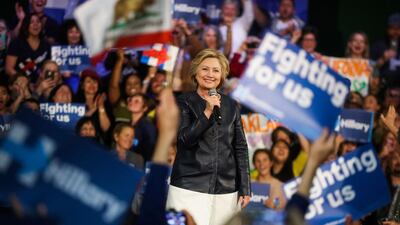So far this year, the markets have been contemplating “known unknowns”, to borrow the expression of former US defence secretary Donald Rumsfeld.
These have included, when will the Fed tighten monetary policy again, will China’s economy suffer a hard landing and where is the price of oil heading.
The markets have fairly balanced assumptions about these issues but with little real visibility on most of the actual outcomes expected until summer at the earliest, “selling in May and going away” is proving to be a popular choice right now.
It is the “unknown unknowns” that are the really difficult ones, according to Mr Rumsfeld. Obviously, by their nature, we do not know what these will yet turn out to be about. It is quite possible to hazard a guess about what they might be related to, with a Brexit referendum approaching in June and, in all likelihood, an ugly US election looming in November, between Donald Trump and Hillary Clinton.
The consensus expectation about these two events is that Britain will remain part of the European Union (EU) after June 23 and that Hillary Clinton will win the US presidency at the end of the year.
Both outcomes appear to have been discounted by the markets and both would provide a degree of reassurance about where the world is heading, allowing markets to continue to think relatively calmly about the known unknowns as well.
In the event that the consensus turns out to be wrong on at least one of these two issues, the markets will be thrust suddenly into the potentially dangerous and chaotic world of unknown unknowns. Not only would the implications of these events – Brexit and a Trump victory – themselves be unclear, but the outlook for the Fed, for China and for oil, the known unknowns, would suddenly become more precarious.
Even assumptions about what are viewed as known knowns might also be questioned, such as the likely continuation of free trade, the stability of global alliances and the conventional approaches to problem solving that the world has become accustomed to.
The possibility of both Brexit and a Trump victory may not be something that many have considered, or want to consider, but as both the EU referendum and the US election draw nearer the more likely it will be that markets will have to give some thought to such unexpected outcomes. They may even begin to connect both issues, especially after Donald Trump last week suggested that Britain would probably be better off outside the EU. His preference for Brexit should not be surprising, as a victory for the Leave campaign in the UK may indirectly give a boost to his own insurgency against the conventional politics of Washington DC.
Not surprisingly, therefore, the IMF, OCED and even President Obama have warned vocally about the risks attached to Brexit in sometimes apocalyptic terms. The IMF has talked about the potential for “severe global damage” in the event that the UK votes to leave the EU, while Mr Obama has appeared to threaten the future of the US-UK “special relationship” by telling Britain it would have to get “to the back of the queue” when it comes to doing trade deals.
International organisations may think more carefully about publicly advocating a position on the US election, just as global leaders will almost certainly be more wary of vilifying Donald Trump than they were a few months ago. But such silence should not obscure real concerns about protectionism, about security and about economic and financial market stability in the event of a Trump election win.
At the moment, the markets are paying little heed to either of these potential outcomes and they even appear to have found some form of uneasy equilibrium when it comes to thinking about the known unknowns of global growth, oil and interest rates.
These issues could quickly look far more challenging again in an environment where Mr Rumsfeld’s unknown unknowns suddenly come to the fore. While Brexit and the upcoming US election are not completely unknown risks, the markets are underestimating their potential to damage long-held certainties about global trade and even to throw up potentially far-reaching questions about the future world order.
Tim Fox is the chief economist and head of research at Emirates NBD.
business@thenational.ae
Follow The National's Business section on Twitter


